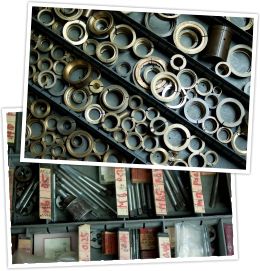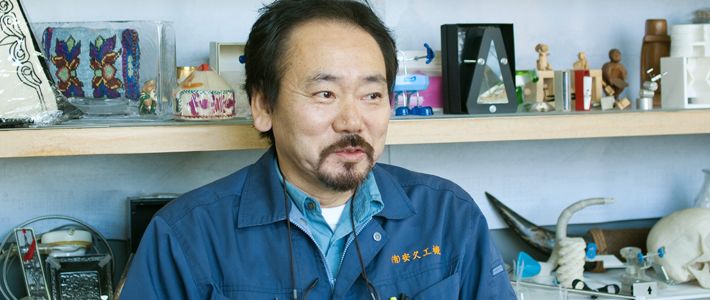
Yasuhisa Koki: Creative Power for New Medicine and Welfare Fields
Economy Science Technology- English
- 日本語
- 简体字
- 繁體字
- Français
- Español
- العربية
- Русский
Creating a Prototype Artificial Heart
Since it was founded in 1969, Yasuhisa Koki has been producing the prototypes and trial models that provide the foundation for new products. The company’s products, made on commission for companies and universities, cover everything from artificial hearts to tactile drawing pens for the visually impaired and foldable warning cones (“patacones”). Almost all these products mark new breakthroughs. By giving shape to ideas, the company’s unique work embodies Japanese innovation.
A single factory in a small-scale industrial zone in Tokyo’s Ōta Ward is hardly Silicon Valley. Yet the challenge to develop innovative new products is yielding impressive results in fields targeted by Japan’s new economic strategy, such as medicine and welfare.
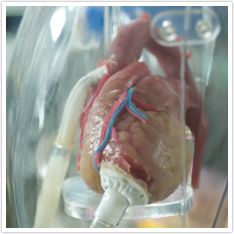 What looks at first glance like a ball of blood is in fact a prototype model of an artificial heart. The company ran exhaustive trials to ensure that the heart pumps smoothly.
What looks at first glance like a ball of blood is in fact a prototype model of an artificial heart. The company ran exhaustive trials to ensure that the heart pumps smoothly.
At first glance, the oil-stained workspaces inside Yasuhisa Koki look just like any other factory. A closer look reveals a red lump of what looks like flesh and blood left on a work surface. “This is a prototype artificial heart,” explains company president Tanaka Takashi.
“We’re taking part in a project organized by Waseda University. There’s a membrane inside the pump that uses air pressure to send out blood. Blood clots can cause a stroke or renal failure, so it’s vital to ensure that the blood flows smoothly. We need to be very careful about choosing the right materials, particularly with regard to the coatings used over the connections between different parts.”
Ensuring a smooth flow of blood is a matter of life and death. Yasuhisa Koki works steadily, making small improvements that edge the product ever closer to the exacting standards required by the university, all the while working hard to ensure safety. The university needs a product that is simple, accurate, and inexpensive. To help him meet these needs, the company president has a doctorate from Waseda University in artificial heart research. Prototypes that do not make the grade often have too many unnecessary options, making them expensive. Despite their cost, they often offer only low precision. A lack of study and research is to blame, says Tanaka, who believes that application and thoroughness are what determine the value of a product.
New Ideas from New Combinations
 The foldable patacone is one of Yasuhisa Koki’s patented products. The compact cones have attracted considerable interest from overseas.
The foldable patacone is one of Yasuhisa Koki’s patented products. The compact cones have attracted considerable interest from overseas.
Achieving this kind of high value is not easy. Nothing speaks more eloquently of the difficulties involved than the sheer length of time Yasuhisa Koki spends on product development. The company spent more than 10 years developing the artificial heart. Turning the patacone into a viable product took five years, and the pen for visually impaired people was eight years in the making. The work involves a painstaking process of repeated trial and error. What does it feel like to engage in this kind of work?
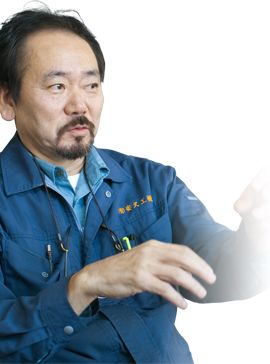
“At the risk of sounding glib, our main aim is to make things that help people. In particular, we want to do whatever we can to help the visually impaired or contribute to the work of rehabilitation and welfare facilities. Also, giving added value to our products by concentrating on a niche area is the only way we can compete with major corporations.”
It is this dedication that drives the company’s ideas and products—but what about the technical skills that have seen the company chosen by the Ministry of Economy, Trade and Industry as one of the seven top venture-capital companies in Japan? The answer is rather unexpected.
“Actually, we don’t really specialize in any particular technology. We just take common machine elements and turn them into products. If anything, our originality comes from being constantly on the lookout for new combinations of machine elements. We tend not to get hung up on preconceived ideas and expectations. Instead of using fixed ideas—thinking of what people would normally do—we solve problems by somewhat unusual, unexpected methods.”
Rather than building products from scratch, Yasuhisa Koki combines disparate elements to create something new. This approach has a lot in common with the “crossover” philosophy that drives cutting-edge innovation in IT and similar fields.
“This philosophy is based on our huge collection of parts. Many of them are almost the same, just differing in size by a few millimeters or so. Parts we’ve used in previous processes are kept in drawers in the factory, ready to be used as components in a new prototype whenever they are needed. It might seem pointless or wasteful to have so many different parts lying around. But in fact it’s vital. It’s by combining those parts that new possibilities emerge.”
The Importance of Networks
But what drives the company to specialize in prototypes and trial models?
“The harsh reality is that large-scale orders tend to go to factories in the regions, where costs are cheaper. The advantage we have in the city is that it’s easier for us to build a network of relationships with universities and so on. By entering partnerships with these institutions, we can develop the trial models and prototypes that serve as the models for mass-produced goods. This is how we have managed to survive and grow as a company. We also have a network of more than 50 companies who process parts for us right here in Ōta Ward. We have a good idea of their respective strengths and weaknesses, and that enables us to work together to develop even better things.
“We have close relationships with many people and companies within walking distance of the factory. Someone might bring along a project they think we can handle. I’ll take a look and draw up plans for a trial product, and then allocate the work to whichever processing firm I think is best suited to that particular job. We are like a bridge between the end client and the processing company. It’s networks like this that have allowed us to build up our impressive stock of high technology.”
In most businesses, a project like this would work in a top-down fashion: customer, company, contractors, subcontractor, and so on. This means that even if the processing company at the end of the chain has a good idea, it is not easy to act on it. But at Yasuhisa Koki, things work the other way round. Yasuhisa Koki is a networking company, taking the lead in local collaboration between industry and universities. This network continues to produce original products. One of the latest achievements is the company’s tactile drawing pen for visually impaired people.
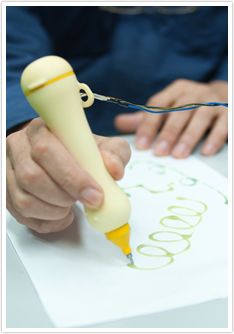 Tactile drawing pen for children with visual impairments. The ink is beeswax. The product was developed as part of a Ministry of Health, Labour and Welfare project to support autonomy and independence for the disabled in fiscal 2010/11.
Tactile drawing pen for children with visual impairments. The ink is beeswax. The product was developed as part of a Ministry of Health, Labour and Welfare project to support autonomy and independence for the disabled in fiscal 2010/11.
“It was an art teacher at Kagawa Prefectural Visually-Impaired School who first came up with the idea for the pen. But actually developing it into a viable product turned out to be quite difficult. In the early stages, we had problems with the brush drying and the wax falling out in drops. Eventually, we managed to come up with a method for making a core of wax putty that dries in about 20 seconds. This is what we call the tactile pen unit.”
Finally, I asked about the relationships that Yasuhisa Koki is building with customers to create such original products.
“For us, it’s not enough just to do what the customer has asked for. We’re proactive about making our own suggestions too. If you want to make something good, you can’t be subservient to the customer. It’s important that you’re able to speak your mind frankly on an equal footing. We always make an effort to speak in the same frank, straightforward way, regardless of who we may be talking to—even if it’s a doctor or professor.”
There is nothing complacent or retiring about Yasuhisa Koki. The company creates its new prototypes from a position of equality with customers. This gives us a glimpse of the new Japanese companies that will shape the new industries of the future.
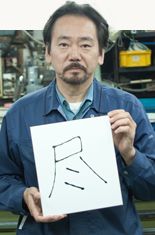 A Message from the Company President
A Message from the Company President- Doing Things Thoroughly (Tanaka Takashi, Representative Director and President)
- The character that best expresses this company is jin, meaning something like “to the utmost.” We are absolutely committed to everything we do. We use our networks to the full and do absolutely everything in our power to achieve the very best results we can. This is good for our clients, too. We always aim to add a little something to the specifications given by the customer. But our aim is not to be experimental for the sake of it. We are passive, in the best sense of the term: receptive and open to ideas. Jin means exhausting trial and error and going that extra mile to develop new products. (The character jin on the left was written with a tactile drawing pen by a visually-impaired child.)
- Corporate Data
-
- Company name: Yasuhisa Koki Co., Ltd.
- Address: 2-25-4 Shimomaruko, Ōta Ward, Tokyo 146-0092
- Representative: Tanaka Takashi, Representative Director and President
- Business: mechanical design, processing of parts for precision instruments, manufacture of tools; design and manufacture of specialized machinery and trial devices; materials processing; planning and manufacture for other prototype development
- Awards: Selected as one of the Ministry of Economy, Trade and Industry’s “Seven Top-level Venture Companies”; Commissioner General’s Prize, Police Equipment and Materials Contest (Patacone foldable warning cone); Special Prize, Ota Ward New Product Contest (tactile drawing pen)
- Capitalization: ¥10 million
- Employees: 6
- Website: http://www.yasuhisa.co.jp/
(Originally written in Japanese by Tsuda Hiroshi and Konno Ayaka. Photographs by Kagioka Ryūmon.)
manufacturing Ōta Ward patacone prototype small to medium enterprise artificial heart Yasuhisa Koki
